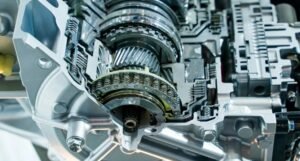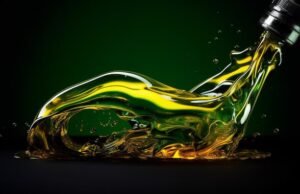
How to chose Industrial Gear Oil in Nigeria : Maintenance for Factory & Plant Machinery
How to chosse Industrial Gear Oil in Nigeria : Maintenance for Factory & Plant Machinery Get In Touch In the relentless environment of Nigerian industry—from
Best Engine Oil in Nigeria is the lifeblood of your vehicle’s engine. It ensures smooth operation, reduces wear and tear, and enhances fuel efficiency. In Nigeria, where road conditions, extreme heat, and heavy traffic put extra strain on engines, selecting the right lubricant is critical.
This comprehensive guide will help you:
✔ Understand different types of engine oils
✔ Learn how viscosity and ratings affect performance
✔ Compare synthetic, semi-synthetic, and mineral oils
✔ Avoid common mistakes when choosing oil
✔ Discover why R8 Drive Lubricants is a top choice
By the end, you’ll know exactly which oil is best car engine oil in Nigeria between Nigeria Engine Oil, ensuring peak performance and longevity.
Key Functions of Engine Oil
Lubrication
Reduces friction between moving parts (pistons, crankshaft, valves).
Prevents metal-on-metal contact, reducing wear.
Cooling
Absorbs and dissipates heat from combustion and friction.
Prevents overheating, especially in Nigeria’s hot climate.
Cleaning
Contains detergents that remove sludge, carbon deposits, and metal particles.
Keeps the engine clean for optimal performance.
Protection Against Corrosion
Forms a protective layer to prevent rust and oxidation.
Sealing
Helps piston rings seal properly, improving compression and efficiency.
What Happens If You Use the Wrong Oil?
❌ Increased Engine Wear – Poor lubrication accelerates component damage.
❌ Overheating – Inadequate heat dissipation can warp engine parts.
❌ Sludge Buildup – Low-quality oil leaves harmful deposits.
❌ Reduced Fuel Efficiency – Higher friction increases fuel consumption.
There are three main type of engine oil in Nigeria or motor engine oil in Nigeria out of top 5 best engine oil in Nigeria available:
1. Conventional (Mineral) Oil
Extracted from crude oil with basic refining.
Affordable but requires frequent changes.
Pros:
✔ Cheaper than synthetic engine oil for car.
✔ Suitable for older car models with simple engines.
Cons:
❌ Breaks down faster under high temperatures.
❌ Requires more frequent changes (every 3,000–5,000 km).
Best For:
Older vehicles (pre-2000 models).
Low-performance engine oil car with minimal stress.
2. Synthetic Oil
Chemically engineered for superior performance.
Offers better protection under extreme conditions.
Pros:
✔ Excellent thermal stability (works well in Nigeria’s heat).
✔ Longer lifespan (up to 10,000 km before changes).
✔ Better fuel efficiency due to reduced friction.
Cons:
❌ More expensive than mineral oil.
❌ Not always necessary for older engines.
Best For:
Modern high-performance engines (turbocharged, direct injection).
Luxury and sports correct oil for car.
Vehicles frequently driven in stop-and-go traffic.
3. Semi-Synthetic Oil
A blend of mineral and synthetic oil (typically 30% synthetic).
Balances cost and performance.
Pros:
✔ Better protection than mineral oil at a reasonable price.
✔ Improved resistance to breakdown compared to conventional oil.
Cons:
❌ Not as durable as full synthetic oil.
❌ Still requires more frequent changes than full synthetic.
Best For:
Mid-range vehicles that need better protection than mineral oil.
Drivers who want a cost-effective upgrade from conventional oil.
Vehicle engine oil in Nigeria with Viscosity or motor oil measures how easily oil flows at different temperatures. The “W” stands for Winter, indicating cold-weather performance, while the second number represents high-temperature viscosity oil for cars.
Common Viscosity Grades in Nigeria
| Grade | Best For |
|---|---|
| 5W-30 | Newer petrol engines, moderate climates |
| 10W-40 | Most Nigerian conditions (hot weather, heavy traffic) |
| 15W-50 | High-mileage engines, extreme heat |
Why 10W-40 is Ideal for Nigeria
✔ “10W” – Works well in mild cold (though Nigeria rarely experiences extreme cold).
✔ “40” – Maintains thickness in high heat, protecting engines better than thinner oils.
“S” (Spark Ignition – Petrol Engines)
Latest: SP (2020, best for fuel efficiency and wear protection).
Older: SN, SM, SL.
“C” (Compression Ignition – Diesel Engines)
Latest: CK-4, FA-4 (better for modern diesel engines).
A3/B4 – High-performance petrol and diesel engines.
C2/C3 – Low-viscosity oils for fuel efficiency.
GF-6 – Latest standard for fuel economy and engine protection.
Always check your car’s manual for the recommended rating.
| Feature | Mineral Oil | Semi-Synthetic | Full Synthetic |
|---|---|---|---|
| Cost | Low | Moderate | High |
| Lifespan | 3,000–5,000 km | 5,000–7,500 km | 7,500–10,000 km |
| Engine Protection | Basic | Good | Excellent |
| Best For | Old cars | Mid-range cars | New, high-performance cars |
| Heat Resistance | Poor | Moderate | Excellent |
| Oil Type | Normal Conditions | Severe Conditions* |
|---|---|---|
| Mineral Oil | 3,000–5,000 km | 2,500–4,000 km |
| Semi-Synthetic | 5,000–7,500 km | 4,000–6,000 km |
| Full Synthetic | 7,500–10,000 km | 6,000–8,000 km |
*Severe Conditions: Dusty roads, frequent short trips, heavy traffic, extreme heat.
Ignoring the Car Manual
Always follow the manufacturer’s recommended oil type.
Using the Wrong Viscosity
Too thin (e.g., 5W-20 in extreme heat) can cause engine damage.
Buying Cheap, Low-Quality Oil
May lack proper additives, leading to sludge buildup.
Mixing Different Oil Types
Can reduce effectiveness and cause chemical instability.
Delaying Oil Changes
Old oil loses lubricating properties, increasing engine wear.
✅ High-Quality Formulation – Designed for African driving conditions.
✅ Meets API/ACEA Standards – Ensures engine protection and efficiency.
✅ Enhanced Fuel Economy – Reduces friction for better mileage.
✅ Wide Range of Options – Available in synthetic, semi-synthetic, and mineral grades.
R8 Drive Synthetic 10W-40 – Best for modern engines.
R8 Drive Semi-Synthetic 15W-40 – Great balance of price and performance.
R8 Drive Mineral 20W-50 – Ideal for older vehicles.a
| Vehicle Type | Recommended Oil |
|---|---|
| New Cars (2020+) | Full Synthetic (5W-30 or 10W-40) |
| Mid-Range Cars (2010–2020) | Semi-Synthetic (10W-40) |
| Older Cars (Pre-2010) | High-Quality Mineral (15W-40 or 20W-50) |
| High-Mileage Engines | Synthetic Blend with Additives |
✔ Check your car’s manual for the correct viscosity and rating.
✔ Full synthetic oil offers the best protection but is costly.
✔ Semi-synthetic is a good middle-ground for most Nigerian drivers.
✔ Change oil regularly to prevent engine damage.
✔ Choose trusted brands like R8 Drive Lubricants for reliability.
By following this guide, you’ll maximize your engine’s lifespan, improve fuel efficiency, and avoid costly repairs. Always prioritize quality over price when selecting engine oil between top 20 engine oil in Nigeria!

How to chosse Industrial Gear Oil in Nigeria : Maintenance for Factory & Plant Machinery Get In Touch In the relentless environment of Nigerian industry—from

How to Choose Between Synthetic and Conventional Transmission Oil In Nigeria? Get In Touch In Nigeria, where the vehicle is not merely a mode of

How to Choose the Most Durable Diesel Engine Oil in Nigeria? Get In Touch In Nigeria’s demanding operating environment—from Lagos traffic to northern desert routes—diesel

Sourcing Quality Hydraulic Oil in Nigeria: A Buyer’s Checklist Get In Touch In the dynamic and demanding landscape of Nigerian industry—spanning robust sectors like construction,

Solve This: Top Signs Your Car Needs a Fuel Injector Cleaner in Nigeria Get In Touch In Nigeria’s demanding driving conditions—from Lagos traffic jams to

Group III Base Oil Suppliers Nigeria | High Viscosity Index Base Stocks Get In Touch The Nigerian industrial and automotive landscape is undergoing a silent